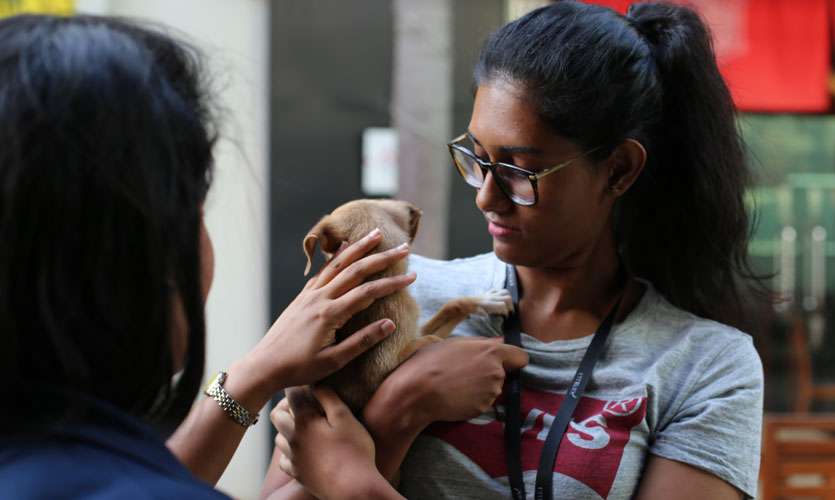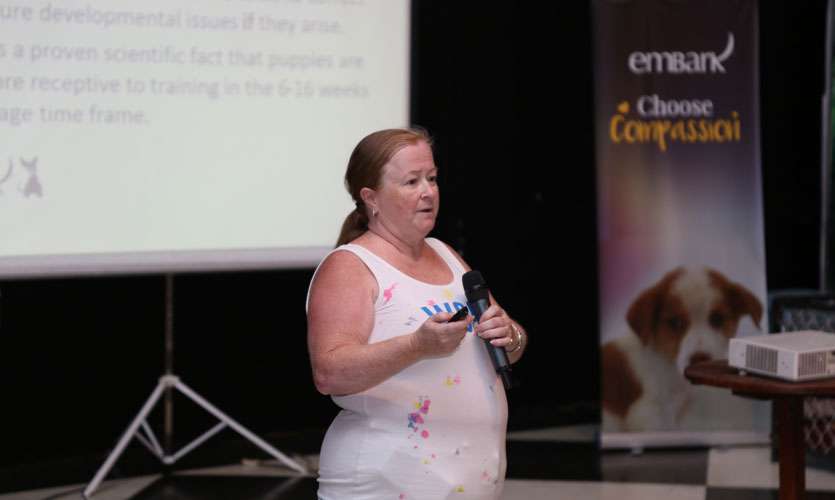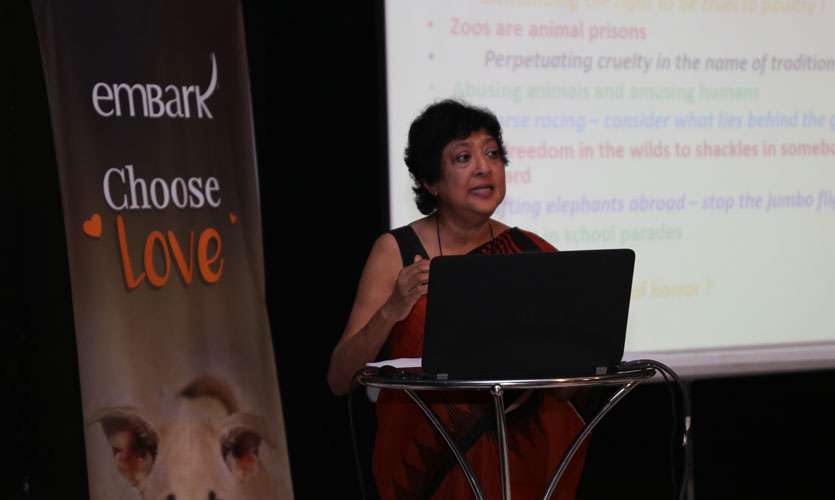May 02 2018.
views 218Embark recently conducted an informative workshop with both local and international guest speakers educating attendees on a range of important topics such as teaching dogs positive behavior, efforts can that be taken against animal cruelty and how to identify and prevent common diseases dogs suffer from.

The first guest speaker was Julie Graves, who is qualified with the Academy of Dog Training Behavior and part qualified with The Kennel Club of Great Britain Accredited Instructor Scheme. During her presentation, Julie spoke about identifying various dog behaviours, finding solutions to negative dog behaviours and providing a positive environment for dogs and puppies to stimulate positive behaviour.

The next speaker was animal welfare advocate and attorney at law Lalani Perera, who spoke about the challenges that are faced by animals and dogs at present, emergency and legal action that can be taken in case of cruelty or dog mistreatment and how the community can help provide better welfare and treatment for dogs.

The third and final speaker was a veterinary surgeon and convener for the veterinary organisation for the eradication of rabies, Dr. Chamith Nanayakkara who spoke about identifying common diseases of dogs and how to prevent them.

Important tips on training your dog
Train for success with kind methods that set the dog up to succeed so failures are fewer. This will ensure the dog is happier, more settled and you will have a better adoption result.
Teach puppies from a very early age. Research shows that puppies are more receptive to training in the 6-16 weeks of age time frame.
Most problem behaviours can be corrected or stopped with training. If you teach a few simple exercises at a very young age you will have the tools to correct future developmental issues if they arise.
Dogs learn by repeating an activity over and over again, so don’t expect a dog to have learnt what you are trying to teach them on the first successful try.
The quickest way to teach a dog is by smell so use treats for the dog to follow the smell. The second quickest way is by sight so use hand signals. The third way is by sound. Learning will take place with all the above.
Distractions can slow learning, so avoid distractions as much as possible when training your dog.
Pay attention to your dog’s body language, especially with rescue dogs. Dogs are programmed to do one of the following if they are unsure of the situation – Fight, Flight Freeze or Flirt. These are natural behaviors that indicate that a dog is not 100% happy which will lead the dog to react negatively, resulting in a fight with the owner or another animal. You need to be able to read the dog’s body language to take action.
Use a magic word to train dogs. A magic word is a word used to mark the behavior you want. Use a word that you don’t use every day and use it at the time the dog is doing a behavior you desire.
The reward doesn't have to be food, it could even mean attention. From the dog’s point of view, the magic word means they are getting something good.
When training your dog try and keep the door closed so that there is a boundary to cross to go out.
Training is all about timing and it will take practice to get it right. Do not train the dog when you are in a hurry, or in a bad mood, this will only make things worse and could again undo your hard work.
Invent tricks to teach the dog to keep things interesting.
When a puppy play bites, say ouch and withdraw from the puppy immediately. Do not continue to play. After a short space of time, you can carry on playing with the puppy. If it bites again, repeat saying ouch and withdraw from the puppy; this must happen every single time the puppy bites! The more consistent your reaction, the quicker the puppy will understand that if they want to interact with youthy have to be nice. It is important that you do this every time, and don’t allow children to tease the puppy into play biting, it will take longer to establish the correct behaviour.

The status of animal welfare in Sri Lanka
The current laws regarding animal welfare are outdated and is inadequate to address cruelty issues. The Prevention of Cruelty to Animals Ordinance which is currently in force was enacted in 1907 and reflects attitudes towards animals in the past. This ordinance only applies to domestic and captured animals, includes limited offenses and has inadequate penalties. There is no state institution that implements this ordinance.
In contrast, the proposed Animal Welfare Bill will provide a comprehensive legal regime that conforms to current international welfare norms. It applies to all animals (any living being other than a human being), includes several new offenses and introduces stringent punishments. The proposed Animal Welfare Bill will have provisions to establish a National Animal Welfare Authority.
The Animal Welfare Bill which yet to be enacted pending since 2006. Several animal welfare activists are pushing for its speedy enactment through petitions, meetings the President and signature campaigns, etc.) 14 activists have sought court intervention and the progress of the bill is monitored by the court of appeal.
Legal provisions have been sought to address animal cruelty, where the animal welfare writ application addresses the slaughter of animals for food among many other issues. Reforms that have been proposed for zoos are under consideration by the relevant government authorities while the Humane Rabies Control Law has been finalised.
Regulatory measures for pet shops have been included in the proposed Animal Welfare Bill while regulatory measures are also included in the proposed Humane Rabies Control Law for dog breeding. Writ applications concerning captive elephant welfare regulations have also been finalised.
Animal welfare campaigners can contribute towards justice for animals by being the voice for animals. Measures such as lobbying policymakers and parliamentarians to reform laws, filing public interest litigation and private complaints, reporting animal cruelty and relentless activism are important aspects that need to be pursued.
The community can support dog welfare by adopting, fostering, sponsoring homeless dogs, engaging in spaying, volunteering time and services to animal shelters, collecting supplies and donating to animal shelters, inspiring local places of worship to give shelter to homeless dogs and reporting cruelty.
By: Shabnam Farook
Pics courtesy: Embark
0 Comments